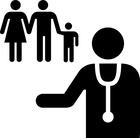Shanghai Street View: Mastering Medicine

Results from a recent poll about Shanghai’s hospitals made for some entertaining reading, but also showed that local residents are quite content with the state of local health care. Despite the frequent complaints some people have about our local hospitals and practices that westerns find strange, I personally also agree that the current system is surprisingly satisfactory and efficient, even if it sometimes lacks the personal touch.
China’s healthcare system has undergone huge changes since the first time I stepped into a hospital in Beijing in the 1980s for a physical exam. The hospitals of that era were truly basic institutions lacking in much equipment, even if their staff of doctors trained in western and traditional Chinese medicine were friendly enough.
Fast forward to the present, when the hospitals of Shanghai have much of the latest equipment available in the west, and in many ways the local system for medical care is even more efficient than its counterpart in the US. Of course many expats will gripe that local hospitals often lack staff who can communicate effectively in English or other foreign languages.
But frankly speaking, I doubt many US hospitals could handle non-English speakers very effectively either, and foreigners should generally expect this kind of language barrier when seeking medical care abroad. Language issues aside, my experiences at Shanghai hospitals have been quite positive on the whole, and in some ways I even prefer the system here to that in the US.
The survey that got me thinking about our city’s local medical system surveyed more than 9,000 people, and found that a big majority of 91 percent of outpatients and 98 percent of inpatients were satisfied with the care they received. Both figures represented small gains over the past year, with each up about 2 percentage points over 2013 levels.
But the survey also contained some more entertaining suggestions for improvement, most notably in hospital food and toilets. Medical bills were also a sore point, with many patients complaining that costs were too high.
Before I start with my own observations, it’s useful to note some of the key differences between the Chinese and US medical systems. The US system relies heavily on private clinics run by individual or groups of doctors. By comparison, nearly all doctors in China work out of hospitals or big state-run clinics. Also in the US, most patients have to visit their general doctor first for any problem, and must get a referral from him or her before being allowed to see a specialist.
These 2 big differences mean that US patients can get treated quickly and conveniently for simple problems like a small infection. But for problems that require a specialist and more complex medical tests, a US patient often needs to make several trips to various clinics and hospitals and wait days for test results, which can make treating an individual problem sometimes take days or even weeks.
The situation is much simpler in China, since all medical professionals, equipment and drugs are concentrated in massive hospitals. After having the unfortunate experience of contracting pneumonia 2 years ago, despite feeling awful, I was pleasantly surprised when I got to quickly see a specialist doctor, received tests and got diagnosed and received appropriate medicine all in the space of a 2 hour trip.
A few other hospital trips have been equally efficient, and I seldom end up spending more than an hour or 2 for an individual problem. That said, the lack of privacy and personalized care are 2 of my biggest complaints, as I do often feel more like a product on an assembly line at Shanghai hospitals than a human being. The Chinese medical care system is also probably much more expensive to operate than its western counterparts, since private clinics are usually far cheaper to run than hospitals.
The current system in big cities like Shanghai contrasts hugely with 20 or 30 years ago, when most care came from basic clinics and hospitals based in people’s state-run work units. Luckily I was quite young when I first came to China in the 1980s, and didn’t have many health problems. But my one trip to a hospital for a physical examination was quite memorable for the facility’s simplicity and its very basic sanitation.
I can also recall 2 stories involving foreign friends who suffered major injuries as a result of accidents around that time, and ultimately had to leave China for treatment after receiving ineffective care at local hospitals.
Nowadays I feel much more comfortable with Chinese hospitals and medical care, though like many foreigners in China I also maintain overseas-based insurance in case I ever need major treatment that isn’t available here. As to the complaints over hospital toilets and food and expensive medical bills, I have to say that those are mostly minor problems that I can easily live with. At the end of the day, fast and effective treatment are what really matters, and in both of those categories I would have to include myself in the big majority of Shanghai residents who are satisfied with the local medical system.
